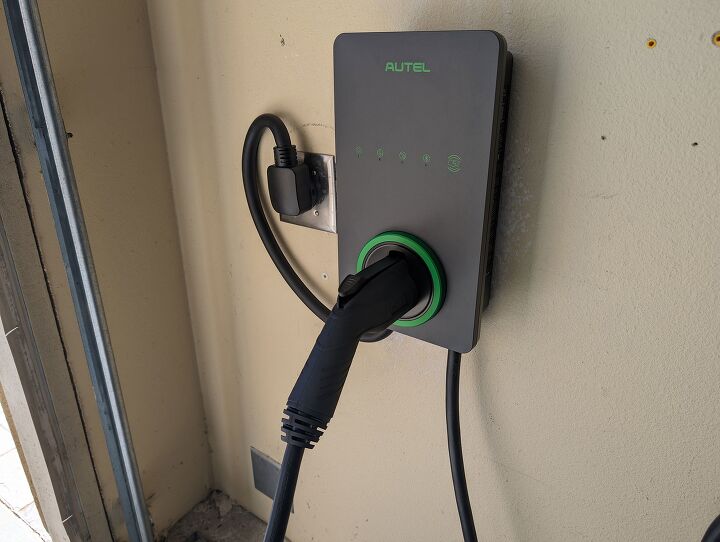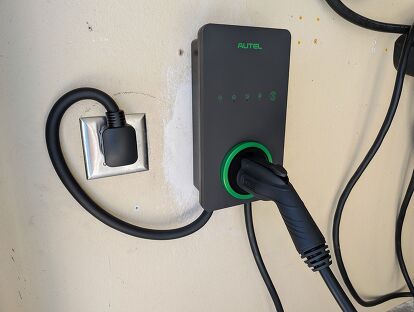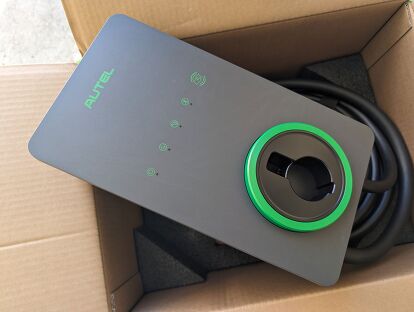Autel MaxiCharger AC Lite Home EV Charger Review

The home EV charger market has changed significantly since I took delivery of my first EV (Tesla Model 3) in 2018. Back then, buying a Tesla made it simple and straightforward when it came time to choosing a home EV charger because of its (at the time) proprietary plug. I did, however, shop around for J1772 chargers in the chance that in the future I decided I no longer wanted a Tesla. Back then, there weren't too many options to choose from, which is why I ended up getting a Tesla Wall Connector since I really didn't want to use an adapter.
Fast forward to 2022, I took advantage of the high used-car pricing rates. I got rid of my Tesla Model 3 and wanted to try out another EV. This meant swapping out my home EV charger for a J1772 unit. I was almost overwhelmed by the number of options available at the time. It was time to start testing all the different home EV chargers I could get my hands on and as you can tell from my photos, the wall of my garage has fallen victim to the installation and removal of numerous home EV chargers.
The latest home EV charger to undergo evaluation in my garage is the Autel MaxiCharger AC Lite Home. Around here, we're familiar with the Autel brand, known for its solid reputation in manufacturing OBD2 scanners. Since 2004, the company has focused mainly on diagnostic products, but it has also expanded into other automotive tools. Due to the growing popularity of electric vehicles, Autel has recently focused on both home and commercial EV chargers. I chose a unit with a NEMA 14-50 plug over a hardwired option, meaning it provides a maximum of 40A or 9.6kW of charging power. The unit is NEMA 4X weather-resistant, allowing for both indoor and outdoor installation.
Upon unboxing the EVSE, the first thing I noticed was its slim design, especially compared to other chargers I've tested. Measuring approximately 13.1875 inches tall, 7.3125 inches wide, and 3.3125 inches deep, its overall footprint isn't the most compact, but it's slimmer than most. The NEMA 14-50 plug is attached to the end of a 2.63-foot power cord, which is longer than some of the other power cords I've dealt with on some units. Finally, the charging connector is attached to a 25-foot cable.
The Autel charger comes well packaged and includes the hardware necessary for installation, including wall anchors, screws, and even screwdrivers. Naturally, mounting this to my wall meant using a drill, so you'll want to have one handy. Installing this Autel charger was probably the most straightforward and simplest process among all the home EV chargers I've tested. It just requires two screws to secure the mounting bracket to the wall. Once done, the charger hooks onto the bracket, and a single screw secures it in place.
After plugging in the charger, I downloaded the Autel Charge app to set up the charger. The process is similar to other connected EV chargers, where I had to scan a QR code and connect to the charger via Bluetooth. Then, I connected the charger to my WiFi, enabling me to access the charger from anywhere. I must say, Autel's app is the best I've used. In the past, I've had frustrating experiences with Wallbox's app, and recent changes to the Enel X JuiceNet app have been problematic. I expected to encounter Bluetooth connection issues, WiFi disconnections, or intermittent notifications with Autel's app, but surprisingly, none of that happened.
With the EV charger installed and set up, it was time to test it on my vehicle, a Polestar 2. The Autel connector is very similar to the connector found on the Wallbox Pulsar Plus, which is a good thing. Its exterior has a rubber texture, which I greatly prefer to the hard plastic found on other chargers. It feels premium and, more importantly, offers a better and more comfortable grip, reducing the chance of accidentally dropping the connector. Unfortunately, accidents happen, and I've seen cracked plastic connectors before.
Funny enough, the least important factor in evaluating EV chargers nowadays is how well they charge, at least to me. From my experience having tested nearly a dozen of these, EVSEs either work or they don't. When they do work, charging rates are quite similar across the board, limited by the power supplied to the unit. Reliability is more important, as is whether things get a bit too hot for comfort. Over two weeks, I had no issues charging my Polestar 2 and a Toyota Prius Prime with the Autel charger. Neither the charging unit nor the cable got too warm, indicating the slim profile doesn't detrimentally affect the charger's performance, as far as I can tell.
However, there is one issue worth mentioning. I have a single car garage, which means space gets rather tight. For the Autel charger, the built-in connector holder extends straight out rather than at a downward angle, which I'm not a fan of. The result is that the connector protrudes quite a bit from the wall, which really defeats the benefit of having a slimmer profile charger. Given how narrow my garage is, I had to use a separate holster to use the Autel charger, otherwise the side mirrors of my car would be very unhappy. I realize this won't apply to most EV owners installing this charger at home, but it's worth mentioning. Again, you can always purchase a separate charger holster and install it separately.
My other minor gripe with the Autel charger is the lack of real cable management for the charging cord. You're expected to wrap the cord around the charger, which, admittedly, is quite standard in this space. Including a separate holster would have been beneficial for Autel. It's available as an option for the MaxiCharger AC Elite Home Charger, which is a bit more expensive than the EVSE being reviewed here. If you're in a similar situation as me, I would recommend buying a separate charger nozzle holster with a hook to go with this Autel unit.
Autel MaxiCharger AC Lite Home EV Charger
Overall, the Autel MaxiCharger AC Lite Home EV Charger is a great option in the home EV charging space. It's competitively priced for a connected smart charger and deserves much credit for the app's performance. The NEMA 14-50 plug-in option offers up to 40A, adjustable to 32A, 24A, and 16A. The app allows scheduling charging sessions to take advantage of off-peak utility rates. However, I prefer setting the scheduler through the vehicle rather than the charger. The NEMA 4X rating ensures safe indoor or outdoor installation, as the unit is dust-tight, water-tight, and protected against rain and ice formation.
The charger is Alexa compatible, but I don't own any Alexa devices, so I couldn't test this feature.
Autel offers 24/7 customer support and a three-year warranty with the home EV charger.
Autel provided me with the home EV charger for testing and evaluation. The company was not provided a copy of the review prior to publishing.

Jason Siu began his career in automotive journalism in 2003 with Modified Magazine, a property previously held by VerticalScope. As the West Coast Editor, he played a pivotal role while also extending his expertise to Modified Luxury & Exotics and Modified Mustangs. Beyond his editorial work, Jason authored two notable Cartech books. His tenure at AutoGuide.com saw him immersed in the daily news cycle, yet his passion for hands-on evaluation led him to focus on testing and product reviews, offering well-rounded recommendations to AutoGuide readers. Currently, as the Content Director for VerticalScope, Jason spearheads the content strategy for an array of online publications, a role that has him at the helm of ensuring quality and consistency across the board.
More by Jason Siu


























































Comments
Join the conversation